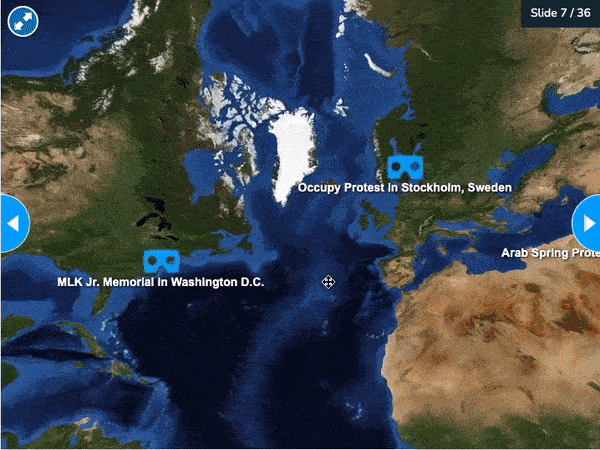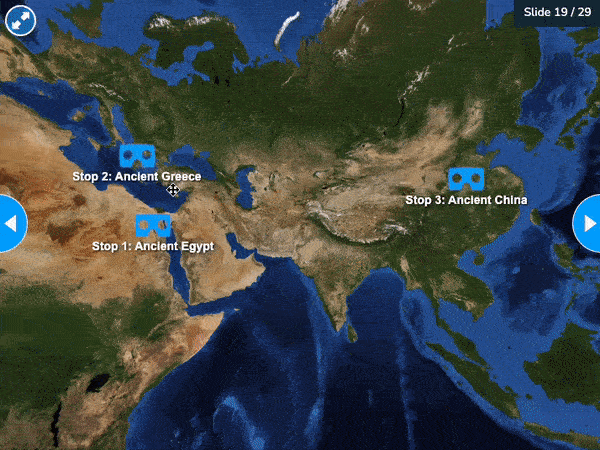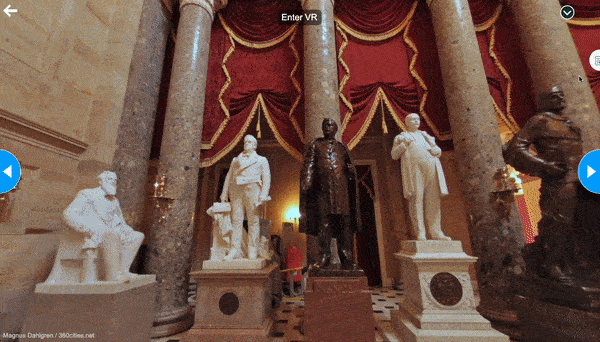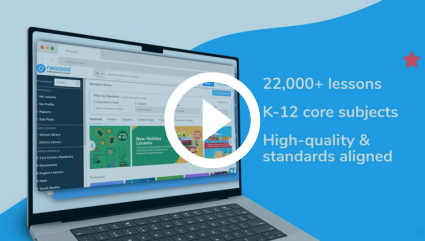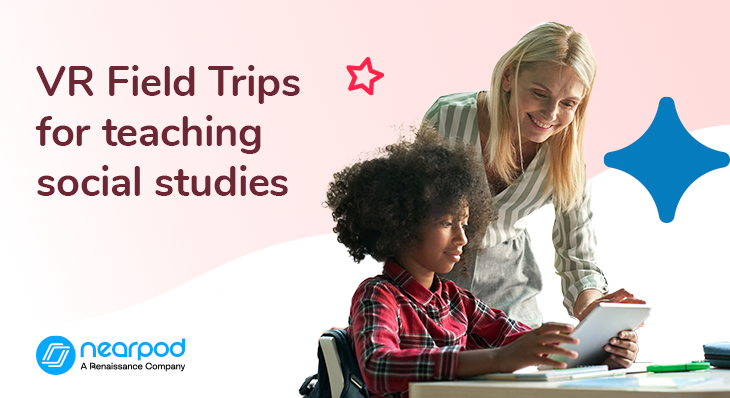
3 Ways to use virtual reality (VR) field trips for social studies
For many students, learning about history from a textbook can feel uninspiring and disconnected. The names, places, and events can seem abstract, making it difficult for them to engage with the material. However, social studies virtual field trips can change that by transforming these historical lessons into immersive experiences. With virtual reality (VR), students can be transported to significant locations and events, gaining a first-hand understanding of history’s impact. Nearpod’s virtual field trips make this possible by offering them a unique opportunity to explore and interact with the past like never before. This approach not only enriches their historical knowledge but also boosts learning outcomes by making lessons more memorable and impactful.
Foster a love of learning in every student with Nearpod. Teachers can sign up for free below to access and create interactive lessons. Administrators can schedule a call with an expert to unlock the full power of Nearpod for schools and districts.
3 Ways to use virtual reality (VR) field trips for social studies
Virtual field trips in social studies expand horizons beyond the classroom. You can take students anywhere in the world right from their desks to create interactive social studies experiences. Here are 3 engaging ways to use VR in social studies this year!
1. Understand legacies through locations
Another great use of VR is to bring historical figures to life in your classroom. We often read to students about the accomplishments of these famous people, but that can be very teacher-centered and one-sided. It’s a much more powerful experience when students can move beyond the text and literally walk in the shoes of notable humans. Through exploring these locations, students can use their observations to think critically and discover their impact rather than simply read about it.
For example, the VR lessons on the life of Martin Luther King Jr. each provide a deeper look into who he was as a person. Sure, you can view his speech online and read about his life, but why not instead immerse yourself in the locations that shaped who he became? By visiting the actual site of his “I Have a Dream” speech or exploring Morehouse College, where he spent his teenage years, students can see the things that helped create his legacy.
Whether you teach in a classroom or a virtual environment, here are some examples of social studies virtual field trips you can use to explore historical events and figures:
- Abraham Lincoln: In this Nearpod virtual reality lesson, students investigate the life and legacy of President Abraham Lincoln, including the Gettysburg Address and the Homestead Act of 1862. Students take virtual field trips and create a poster to share what they learned.
- Rosa Parks: In this Nearpod VR lesson, students investigate the life and legacy of Rosa Parks, including her work as a Civil Rights activist and serving as a secretary in the NAACP. Students take a virtual tour and create a poster to share what they learned.
- Cesar Chavez: In this Nearpod VR lesson, students investigate the life and legacy of Cesar Chavez, including the founding of the National Farmworkers Association. Students take virtual field trips and create a poster to share what they learned.
- Nelson Mandela: In this Nearpod VR lesson, students explore and investigate the life and legacy of Nelson Mandela, including co-founding the “Spear of the Nation” and the South African presidency. Students take virtual field trips and create a poster to share what they learned.
- Exploring Ancient Empires: In this immersive VR lesson, students learn about the world’s great empires as they explore the ancient ruins of Egypt, Greece, China, and the Inca Empire via virtual reality and make predictions about values and daily life at the time.
2. Explore diverse cultures
As large and diverse as our country is, many students have limited experience outside of their hometown. VR can be used as a quick lesson hook to activate background knowledge before diving deeper into the content. VR integrates seamlessly into the Nearpod platform, so you can take a quick field trip to a location and then jump right back into your core lesson without missing a beat. Explore famous landmarks across all 7 continents. Journey through nature in our country’s national parks. Travel to key sites from world events like the French Revolution and World War II. There are countless field trips available already. It’s easy to find social studies virtual field trips that support your lesson goals!
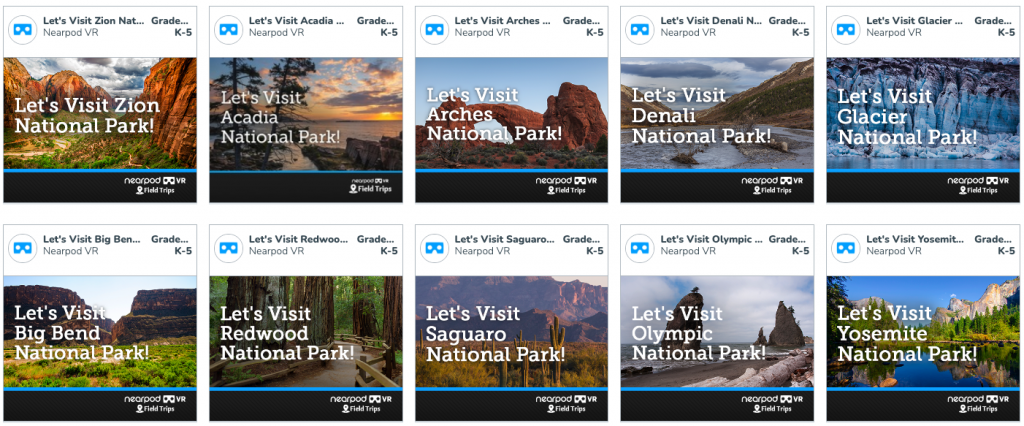
3. History from a first-person perspective
Many of the events covered in history books have occurred in places students have never seen and probably won’t visit in the near future. Social studies virtual field trips are a great way to transport students to these sites! They can then connect what they see to the events they read about. Nearpod’s Social Studies Program leverages VR experiences to support deeper thinking about the events that shaped our country. Virtual reality in history education not only shows students where those events occurred but also explores what it might have felt like actually to be there. This new personal, possibly emotional, connection to these events will give students an entirely new take on history and a deeper understanding of how these events impacted lives.
The Nearpod Social Studies Program is a K-12 supplemental curricular program that works with you to create immersive social studies experiences that make students a part of every instructional moment. Get 2,500+ standards-aligned interactive lessons, videos, and activities exclusive to the program to help you make every lesson memorable, bring social studies to life, and give students more ways to learn. This program is available as an add-on for school or district licenses.
Start using social studies virtual field trips with Nearpod
Social studies virtual field trips provide an exciting and effective way to engage students in history lessons, taking them far beyond the traditional classroom setting. By integrating VR experiences into the curriculum, teachers can bring historical figures and events to life, explore diverse cultures, and give students a first-person perspective on history. These interactive experiences enhance learning outcomes by fostering a deeper connection to the content, encouraging critical thinking, and making history feel relevant to students’ lives.
Foster a love of learning in every student with Nearpod. Teachers can sign up for free below to access and create interactive lessons. Administrators can schedule a call with an expert to unlock the full power of Nearpod for schools and districts.

Kali is a tech-savvy elementary teacher whose passion for all things STEM fuels her innovation in the classroom and inspires other teachers to begin their own #edtech adventures.
